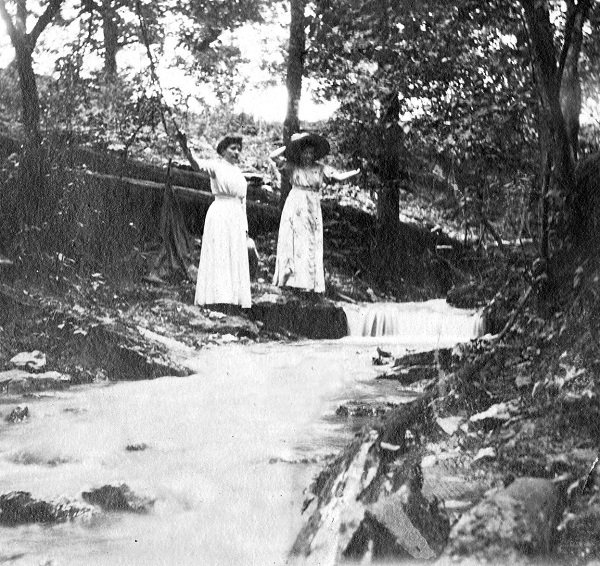"Why, you are an old settler," said a newcomer to us recently.
"Yes," I replied proudly, "we consider ourselves natives."
Yet, when we drove into the Ozarks twenty years ago, with a
covered hack and a pony team, we found the "old settler"
already here. In conversation with us he made the remark:
"My father was an old settler here. He came up from Tennessee
before the war.* Since then in working the fields we have found
now and then a stone arrow or spearhead made by a settler older still."
Vintage Postcard From The Ozark Mountains
When we came to the Ozarks, a team of fairly good horses would trade for
forty acres of land. The fences were all rail fences and a great many of the houses
were built of logs. The country was a queer mixture of an old and a new country.
A great many fields had been cropped continually since the war and were so
worn out that as one of the neighbors said, "You can't hardly raise an
umbrella over it." Aside from these old fields, the land was covered with
timber and used for range. The "old settlers" told us that the thick growth
of timber was a comparatively new thing; that before the country was so
thickly settled, there were only a few scattering large trees.
The fires were allowed to run, and they kept down the growth of timber,
Wild grasses grew rankly over all the hills and cattle pastured freely.
It has always been a great pleasure to hear the tales of earlier days.
A neighbor, Mrs. Cleaver, told us stories of her experience in war times
and the days, equally as bad, which immediately followed. Her husband did
not go to war, but one night a band of men came and took him away.
She never knew what became of him. Then came the hard days for her
and her young stepson. They raised a little crop and a hog or two for
their living, but whenever they had stored a little corn or meat,
some lawless bands of raiders that infested the Ozark hills would come
and take it from them. When the war ended, some of the leaders
of these lawless bands continued their depredations, only in a
little different fashion. Through the machinations of one of them,
Mrs. Cleaver's stepson was taken from her, by due process of law,
and bound out to them until the boy should be of age, to work without
wages, of course. When Mrs. Cleaver protested, I suppose in
rather a frantic way, she was driven from the courthouse,
with a horsewhip, by the sheriff.
Not all the old-time stories were so serious. There is the story of the
green country boy who had never seen a carpeted floor. A new family
moved in from the North somewhere, and this boy went to the house one day.
As he started to enter the door, he saw the carpet on the floor.
Standing in the door, he swung his long arms and jumped clear across
the small room, landing on the hearth before the fireplace.
Turning to the astonished woman of the house, he exclaimed:
"Who Mam! I mighty nigh stepped on your kiverled."
(coverlet or bedspread).
Our friend in telling this story always ended with: "I never could
make out whether that boy was as big a fool as he pretended to be or not.
He made a mighty smart businessman when he was older and made the
businessmen of Kansas City and St. Louis hustle to keep up with him"
which is the way the hill boys have.
One old lady, who has lived here since the war, says that when she came
the "old settlers" told her of the time when a band of Spanish adventurers
came up the Mississippi River and wandered through the Ozarks.
Somewhere among the hills they hid their treasure in a cave, and
it has never been discovered to this day.
But how old must a settler be to be an "old settler"? Or if you
prefer the famous question, "How old is Ann?"*
Laura (left) and with daughter Rose standing
in the ravine on Rocky Ridge Farm.
"When Is A Settler An Old Settler"
Written in June 1916
By Laura Ingalls Wilder
(1867-1957)
An essay from the book,
"Little House In The Ozarks"
A Laura Ingalls Wilder Sampler
The Rediscovered Writings
Edited by Stephen W. Hines
1991 Guideposts Edition
*The war referred to was the American Civil War
* "How old is Ann" is slang for "Who knows?"



No comments:
Post a Comment